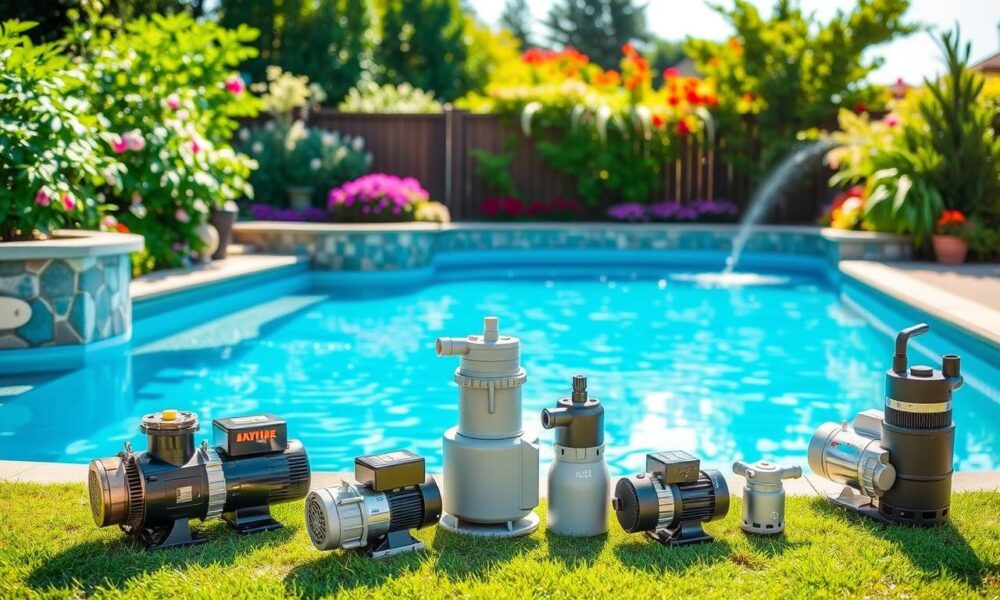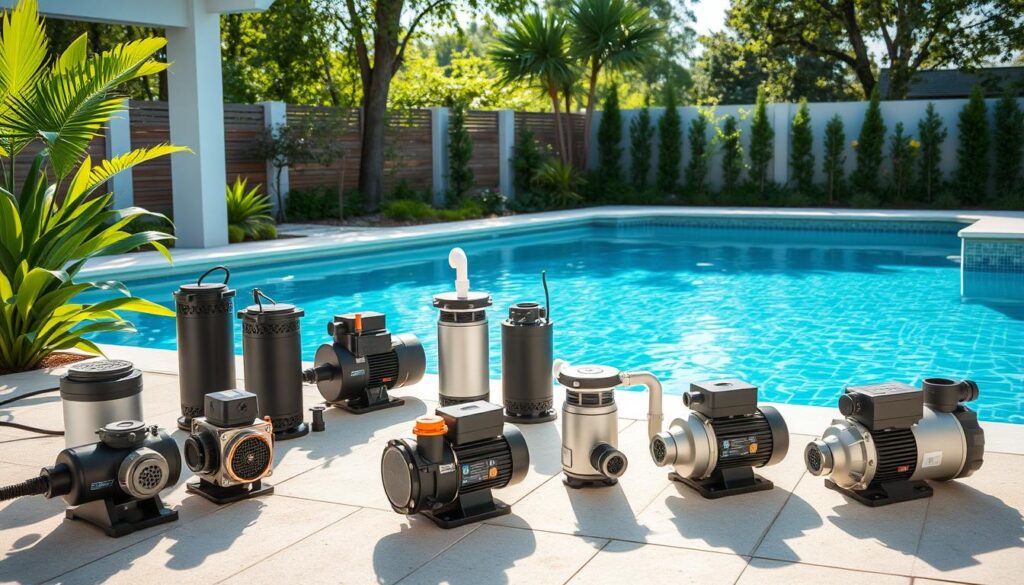
Understanding Pool Pumps: A Comprehensive Guide for Pool Owners
Keeping your pool clean and inviting is a big deal for many homeowners. The pool pump is key to this effort. It circulates and filters the water, keeping it clean and safe. This guide will help you understand pool pumps better. You’ll learn about their importance, how they work, and how to choose, maintain, and use them for a great pool experience.

Key Takeaways
- Pool pumps are essential for circulating and filtering pool water, ensuring cleanliness and proper circulation.
- Different types of pool pumps serve various functions, from single-speed to variable-speed options, each with unique advantages.
- Selecting the right pool pump for your pool size and needs is crucial for efficient operation and energy savings.
- Proper pool pump maintenance and troubleshooting can extend the lifespan of your equipment and prevent costly issues.
- Energy-efficient pool pump options can significantly reduce your energy costs and carbon footprint.
What Are Pool Pumps and Why Are They Important?
Pool pumps are key to keeping your pool clean and healthy. They are the heart of your pool’s circulation system. They move water around the pool and through the filters. Knowing how pool pumps work is important for pool owners who want a clean pool.
Understanding the Role of Pool Pumps
Pool pumps’ main job is to circulate water through the pool’s filters. They draw water from the pool, filter it, and then return it. This keeps the water clean and evenly treated.
It also helps spread chemicals and keeps the water temperature right. Plus, it stops debris and algae from building up.
Types of Pool Pumps and Their Functions
- Single-Speed Pumps: These are simple and cheap. They always run at the same speed, keeping water moving well.
- Variable-Speed Pumps: These save energy. You can change how fast they run to match your needs, saving money.
- Energy-Efficient Pumps: These pumps use less energy but still keep the water clean. They’re good for the environment and your wallet.
All pool pumps work with the pool’s filtration system to keep the water clean. Knowing how pool pumps work is key for a great pool experience.

Selecting the Right Pool Pump for Your Needs
Choosing the right pool pump is key for your pool’s efficient operation. You need to think about pool size, pump size, and pump horsepower to get the best performance and save energy.
To find the perfect pool pump, follow these steps:
- Measure your pool size: Knowing your pool’s size is the first step. Measure its length, width, and depth. This will help you pick the right pump size.
- Determine the required pump flow rate: The flow rate, in gallons per minute (GPM), is vital for good water flow. Look up guidelines or ask an expert to find the right flow rate for your pool.
- Consider the pump’s horsepower: The pump horsepower must match your pool’s needs. The size of your pool, any features like waterfalls, and the system design all play a role in determining the pump horsepower needed.
By carefully thinking about these factors, you can pick the best pool pump for your pool. This will improve performance, save energy, and make your pool more enjoyable.

Choosing the right pool pump is essential for a healthy pool. Understanding pool size, pump size, and pump horsepower helps you make a smart choice. This way, you’ll enjoy a well-circulated and efficient pool.
How Pool Pumps Work: An In-Depth Look
Knowing how your pool’s pump works is key for keeping the water clean and clear. Let’s explore the parts that make pool pumps tick and how they keep your pool water perfect.
The Circulation System Explained
The pool pump operation is at the heart of your pool. It pulls water from the pool, filters it, and then puts it back in. This keeps the water clean, warm (if needed), and safe for swimming.
Understanding Pump Flow Rates and Pressure
The pump flow rate and pump pressure are vital for a good pool system. The flow rate shows how much water the pump can move. The pressure tells us how hard the water flows through the system.
Getting these right is key for a well-circulated pool. Knowing how flow rate and pressure work together helps you choose the best pump for your pool.
Don’t forget, keeping your pool pump in good shape is important. By understanding how it works, you can help it last longer and work better.
Pool Pump Maintenance and Troubleshooting
Keeping your pool pump in good shape is key to clean water and a well-working system. Regular care can make your pump last longer and save you money on repairs. We’ll cover common issues and how to fix them to keep your pump running well.
Common Pool Pump Problems and Solutions
Pool owners often face problems like less water flow or motor issues. Here are some common problems and how to solve them:
- Reduced Water Flow: A clogged basket or filter might cause less water flow. Cleaning the basket and filter regularly can help.
- Pump Motor Issues: Motor problems could be due to a bad capacitor, worn bearings, or electrical issues. A pro pool tech can help fix these problems.
- Leaks: Leaks can be caused by old seals or gaskets. Replacing them can often solve the problem and save water.
Fixing these common problems quickly helps your pool pump work better and last longer. This keeps your pool water clear and your system running smoothly.
Energy-Efficient Pool Pump Options
Choosing the right pool pump is crucial for pool owners. The market now offers many energy-efficient options. These can cut down your energy costs and help the environment.
Variable-speed pool pumps lead this trend. They have smart motors that adjust speed for your pool’s needs. This can save up to 90% of energy, making them a smart choice.
There are also other energy-efficient pool pumps out there. They use new tech to use less power. These pumps work as well as old ones but use much less electricity, saving you money.
When looking for a new pump, think about its energy efficiency. An energy-efficient pump is good for the planet and your wallet. It can save you money over time.
For more info on energy-efficient pumps, talk to Friendswood Custom Pools. They can help you pick the best pump for your needs and budget.
Professional Pool Pump Installation and Maintenance
Having a well-installed and maintained pool pump is key for your pool’s health and function. At Friendswood Custom Pools, we’re proud of our skills in pool pump installation and maintenance services. Our team works hard to give you the best service and make sure your pool pump works its best.
The Benefits of Working with Friendswood Custom Pools
Choosing Friendswood Custom Pools for your pool pump needs comes with many advantages. Our services include:
- Precise pool pump installation for better performance and longer life
- Comprehensive maintenance and repair to keep your pump in top shape
- Energy-efficient solutions to cut down on your utility bills
- Personalized recommendations tailored to your pool’s needs
- Prompt and reliable response to all your pool pump questions
Call (346) 485-3356 for a Free Consultation
Looking to upgrade your pool pump installation or need reliable pool pump maintenance services? Call Friendswood Custom Pools at (346) 485-3356. Our team will offer a free consultation and help you find the best solution for your pool. See the difference our expertise and commitment can make for your pool pump’s performance and life.
Pool Pump Safety Considerations
Keeping your pool pump safe is key to a safe and fun pool area. Pool owners need to know the dangers of pool pumps and how to avoid them.
Electrical safety is a big concern with pool pumps. Bad electrical work can cause shocks, fires, or other dangers. Make sure a pro installs your pump and check the wiring often for damage.
Entrapment hazards are also a big deal. Pool pumps can pull people in, causing serious harm or death. Make sure drain covers and suction outlets are in good shape to lower this risk.
- Keep the pump area clear to avoid overheating and blockages.
- Check hoses and connections for damage and replace them if needed.
- Learn how to safely turn off and start your pump to avoid problems.
By focusing on pool pump safety, you can make your pool a safer and happier place. Always follow the maker’s advice and talk to a pro if you’re unsure.
Factors Affecting Pool Pump Lifespan
The lifespan of your pool pump is key to a healthy and efficient pool. Many factors, like how you use it and the environment, can affect it. Knowing these can help you keep your pool pump running well for longer.
Tips for Maximizing Your Pool Pump’s Longevity
To make your pool pump last longer, try these tips:
- Proper Maintenance: Regular cleaning and filter changes are crucial. Stick to the manufacturer’s schedule to keep your pump in great shape.
- Controlled Usage: Don’t overwork your pump. Find a balance between running it enough and not too much.
- Protecting from Elements: Extreme weather and sun can harm your pump. Keep it safe from these to make it last longer.
- Timely Replacements: Even with care, your pump will need to be replaced eventually. Watch for signs of wear and upgrade to a new model when needed.
Following these tips can help your pool pump last longer. This ensures it keeps working well for you for many years.
Latest Innovations in Pool Pump Technology
The pool pump industry has seen big changes lately. These changes bring new solutions for pool owners. Now, we have smart pumps and energy-saving designs that change how we care for our pools.
Smart pumps are a big deal. They connect to apps on our phones. This lets us control our pumps from anywhere. We can check how much energy they use and get alerts right on our phones.
There’s also a focus on making pumps more energy-efficient. These pumps use new motor designs and features to save electricity. This means lower bills and less harm to the environment. By choosing these pumps, we can keep our pools clean and help the planet at the same time.
FAQ
What are pool pumps and why are they important?
Pool pumps are key to keeping your pool clean. They move water, filter out dirt, and keep the water clear. This makes your pool safe and healthy for swimming.
What are the different types of pool pumps and their functions?
There are single-speed, variable-speed, and energy-efficient pumps. Each has its own role in your pool’s system. Variable-speed and energy-efficient pumps save energy and money.
How do I select the right pool pump for my pool?
Choose a pump based on your pool’s size and needs. The right size ensures your pump works well and saves energy.
How do pool pumps work, and what is the importance of understanding pump flow rates and pressure?
Pool pumps circulate water through filters. Knowing flow rates and pressure is key for good water movement and pool health.
What are the common issues with pool pumps and how can I troubleshoot them?
Issues like low flow and clogged filters can happen. Regular checks and quick fixes help your pump run smoothly.
What are the benefits of energy-efficient pool pump options?
Energy-efficient pumps, like variable-speed ones, cut down on energy use. They save you money and are better for the environment.
Why is it important to work with professionals for pool pump installation and maintenance?
Experts, like Friendswood Custom Pools, ensure your pump is installed and maintained right. This makes it last longer and work better.
What safety considerations should I keep in mind when it comes to pool pumps?
Safety is crucial with pool pumps. Proper setup, electrical safety, and upkeep prevent dangers and keep your pool safe.
What factors can affect the lifespan of a pool pump, and how can I maximize its longevity?
Usage, care, and environment can affect a pump’s life. Regular maintenance and proper handling can extend its life.
What are the latest innovations in pool pump technology?
New tech in pool pumps includes smart and energy-saving features. These advancements offer better performance, energy efficiency, and pool management.

